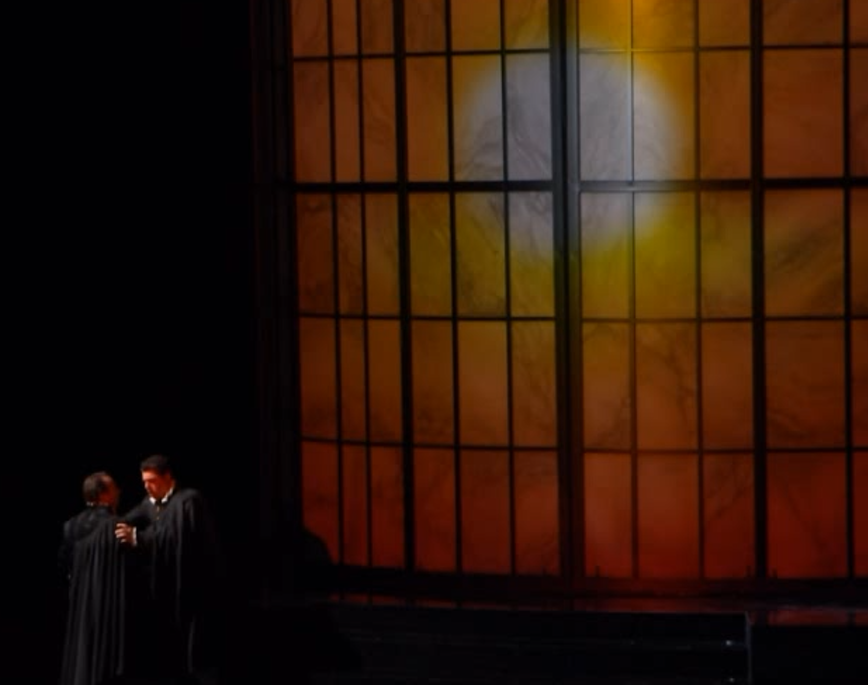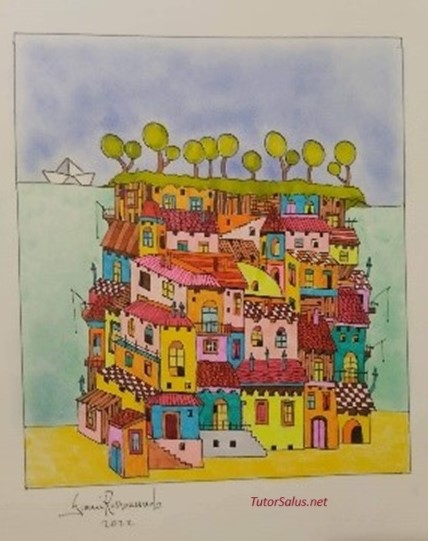
Screenshot shared with ‘Don Carlo’ by Giuseppe Verdi (March 11, 1867 first ever in Paris) : the opera was broadcast live by ‘RAI Cultura’ from the ‘Teatro alla Scala’ in Milan, last December 7, 2023. Director Riccardo Chailly, stage direction by Lluìs Pasqual.
The frame resumes here, from Act III, one of the rarest scenes brightened at the sun, beyond the bars : ‘Don Carlo’, Infant of Spain and heir to the throne, decides to trust Rodrigo, Marquis of Posa.
“Everything will have to be silent… to exalt faith” is the despotism formula of all times, which Giuseppe Verdi makes the Grand Inquisitor pronounce, the ‘blind nonagenarian’ as set out in the libretto[1] of his own ‘Don Carlos’, but also the ghostly voice of an undying progenitor, at the end of a complex work, but not for this less interesting.
The dreadful formula of overbearing is here historically dated – we are in 16th century Spain which sends Flemish heretics to the stake – but ready to re-emerge with any outfit, from time to time over the centuries and to this day, to obtain subordinate. It’s rarest – but possible[2] - to meet rulers in History, capable of recognizing the terrible mistake, that is applied everywhere and unfortunately until the closest personal and family relationships.
An intelligent direction rightly imposes a studied, convincing backdrop of bars locked for a dark time, an elegant and impenetrable gate, plunged in a continuous resentment which only the rendez-vous between Don Carlos and Rodrigo gets to colour, the two confess mutual trust in the uncertainties of History : “Carlos, you can, you can trust me”. The glimmer of space is minimal but reasonable in the widespread obtuseness that holds repetition in its grip : “oppressed the heart, it has no strength”.
Without ever naming it, as a matter of fact Verdi was able to focus on the ever current – and violed – ‘sovereignty’ : powerful when it comes to build despite obstacles and fragilities, impotent when it arrogates all arrogance with its cruelties.
Voices and words that in this opera unfold and through each other, keep that glimmer to a minimum which only music, very very solid, does not close, not even in front of the blinding magnificence of the ‘retablo’, the grand architectural altarpiece of Spanish cathedrals : an inexplicable, rapid, undeniable glimmer. The high skies of the beautiful Spain we know, are here psychically abolished.
It’s just a chance, this opera, not obvious at all.
Marina Bilotta Membretti / Cernusco sul Naviglio – January 14, 2024
[1] François-Joseph Méry and Camille Du Locle are the authors of the ‘libretto’, then translated by Achille De Lauzières and Angelo Zanardini for the first Italian play at Bologna, on October 27, 1867. Giuseppe Verdi (1813 – 1901), one of the greatest musicians and composers in the world, was also – and not only in Italy – one of the most popular and known author in the historical period that preceded the unification of Italy : his music still maintains a strong appeal to constitutive alliances in Europe.
[2] Pope John Paul II in 2000, intervening with a letter on the occasion of the publication of the Acts of the International Symposium of the Inquisition, held in Vatican in 1998. Furthermore, towards Nazism, the Chancellor Willy Brandt (1970) https://ilbassoadige.it/2020/09/30/quando-willy-brandt-si-inginocchio-per-rendere-omaggio-ai-caduti-del-nazismo/ And recently, the Chancellor Angela Merkel (2019) https://www.repubblica.it/esteri/2019/12/06/news/germania_angela_merkel_auschwitz-birkenau-300873897/





